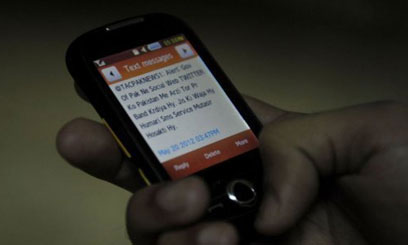The phone has been how Mzee Henry Kamau Mungai hears of construction sites he can lend a hand at and make his living. NAIROBI, Kenya, Oct 9 – It’s plastic, red and has the word ‘Love’ written in gold across its face. It looks like a toy phone. Except it’s not.
NAIROBI, Kenya, Oct 9 – It’s plastic, red and has the word ‘Love’ written in gold across its face. It looks like a toy phone. Except it’s not.
He puts it back into its case made of black and white cow hide and flashes me a grin. Through his stained teeth he asks if now that he’s shown me his defunct phone I’ll give him another. The matatu operators around us laugh. I’m a journalist they tell him. Mungai’s phone was switched off at 11 am, a day after the Communications Commission of Kenya deadline for switching off counterfeit mobile phones passed.
Peter Irungu Mwangi is a matatu driver plying the number 7 route that transports passengers between Gikomba Market and the city centre. His is not a genuine phone either. It’s a counterfeit that takes two SIM cards. And so while his Safaricom SIM card isn’t operational, his other one is but he’s at first reluctant to tell me what mobile phone operator it belongs to, “why would I tell you,” he asks, “so you can go and have it blocked too?”
He eventually reveals the operational SIM card belongs to Airtel. He bought his phone near the popular Tea Room restaurant in downtown Nairobi. He had no idea the phone wasn’t genuine.
“Ask Safaricom why they’d make it impossible for me to use my phone,” Fredrick Osilonga tells me, “after being a loyal subscriber for eight years.”
Osilonga works on the same route as Mwangi. Except he’s a tout. “How am I supposed to get in touch with the owner of the matatu should I be detained for a traffic infraction or if the vehicle gets spoilt?” His phone hasn’t been switched off yet but he has received four warning messages from his mobile phone operator that it soon will.
Violet Muthike doesn’t work far from the number 7 stage. She sells clothes for a living. The Nokia phone she hands me is heavy… too heavy. “I got it from my brother,” she tells me. On her lap is another Nokia held together by a rubber band. This one she got from her aunt but it’s the real deal. Her Safaricom line functions on that one. Her Orange line however still works on the counterfeit.
“It’s a dual SIM,” she explains, “So when I dialled *#06# to check for my IMEI, two numbers came up. I sent only one to check if my phone was genuine. It wasn’t!” She believes the reason one of her lines is still working in the counterfeit phone is because she only used one of the IMEI numbers to check the authenticity of her phone.
Nicholas wasn’t so lucky. His phone could take two SIMs too but both don’t work in his counterfeit phone. “I’ve just bought a Tecno for Sh1,5000,” he tells me. It too can take two SIMs and he can listen to the radio using it. “My other phone had a camera and I could use it to surf the Internet.”
He knew it was a counterfeit. He sells DVDs and TVs on Luthuli Avenue next to phone dealers. “A client comes in looking for a phone that has Wi-Fi capabilities but is willing to spend only Sh3,000. What do you expect?”
The only time he was reminded his phone was counterfeit was when he’d connect to the Internet, “I had to enter the settings manually unlike with original phones where you dial 544 and get the settings automatically. It was also slow connecting to the Internet.”
Nicholas (not his real name) works next to a phone dealer. He’s wary of the authorities. “If I sell a genuine phone,” he tells me, “I’d buy it for Sh1,800 and sell it for Sh2,000 but if I buy a counterfeit one I’ll buy it for Sh1,500 but sell it for Sh4,000.”


































